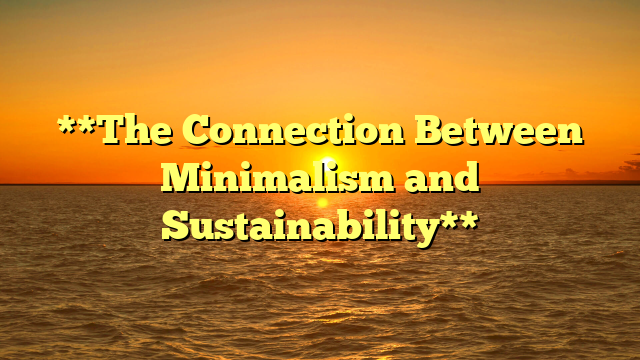
In an era where environmental concerns are becoming more urgent, many people are seeking ways to reduce their ecological footprint. One approach that has gained popularity is minimalism—a lifestyle centered around intentional living and reducing unnecessary consumption. Minimalism and sustainability go hand in hand, as both encourage mindful choices that benefit not only individuals but also the planet. By embracing minimalism, people can adopt a more sustainable lifestyle that promotes conservation, reduces waste, and fosters a healthier environment for future generations.
**Reducing Consumption and Waste**
One of the core principles of minimalism is consuming less. In togel online -driven world, people are often encouraged to buy more than they actually need. This leads to excessive production, which consumes valuable natural resources and generates significant waste. Minimalism challenges this mindset by promoting the idea that happiness and fulfillment do not come from material possessions but from meaningful experiences and relationships.
By purchasing fewer items, individuals contribute to reducing the demand for mass production, which, in turn, helps conserve resources like water, energy, and raw materials. Additionally, buying less means generating less waste, particularly when it comes to single-use plastics, fast fashion, and disposable products that end up in landfills. Minimalists often opt for reusable, durable, and high-quality products that have a longer lifespan, further decreasing their environmental impact.
**Choosing Sustainable and Ethical Products**
Minimalism encourages conscious consumerism—making thoughtful decisions about what to buy and from whom. Many minimalists prioritize ethical and sustainable brands that focus on fair labor practices, eco-friendly production methods, and responsible sourcing of materials. By choosing sustainable products, individuals can support companies that are working toward a greener future.
For example, instead of buying fast fashion items that contribute to pollution and unethical labor conditions, a minimalist might invest in a few high-quality, sustainably made clothing pieces. These items last longer, reducing the need for frequent replacements and minimizing textile waste. Similarly, minimalists often choose natural, biodegradable, and refillable household products over their disposable counterparts.
**Lowering Energy and Resource Consumption**
Minimalism extends beyond possessions—it also influences lifestyle choices. Minimalists often live in smaller, more efficient homes that require less energy for heating, cooling, and maintenance. A smaller living space not only reduces personal expenses but also lessens the demand for construction materials and energy consumption.
Furthermore, minimalists tend to adopt habits that align with sustainability, such as using public transportation, biking instead of driving, and reducing water and electricity usage. By making these changes, they lower their carbon footprint and contribute to a more sustainable world.
**Prioritizing Experiences Over Material Goods**
Minimalism promotes the idea that happiness comes from experiences rather than possessions. Instead of spending money on unnecessary items, minimalists often invest in travel, outdoor activities, or spending quality time with loved ones. These choices often align with sustainable living, as they reduce the need for material goods and encourage a more mindful, low-impact lifestyle.
For instance, rather than purchasing excessive decorations for their home, minimalists may choose to explore nature, visit cultural sites, or engage in creative hobbies that don’t involve excessive consumption. This shift in mindset helps reduce overall demand for mass-produced goods, leading to a decrease in environmental strain. Minimalism and sustainability are deeply connected, as both emphasize intentional choices, mindful consumption, and reducing waste. By adopting a minimalist lifestyle, individuals can make a positive impact on the environment while also simplifying their lives and focusing on what truly matters. Whether it’s by consuming less, choosing ethical products, reducing energy usage, or prioritizing experiences over possessions, minimalism provides a practical path toward a more sustainable and fulfilling life.





